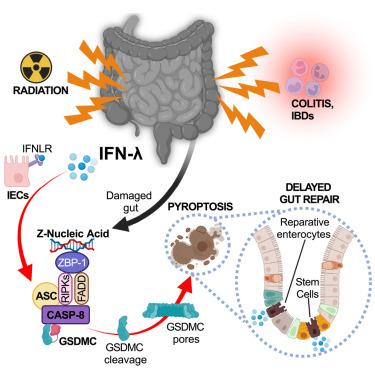Our official English website, www.x-mol.net, welcomes your
feedback! (Note: you will need to create a separate account there.)
Type III interferons induce pyroptosis in gut epithelial cells and impair mucosal repair
Cell ( IF 45.5 ) Pub Date : 2024-11-04 , DOI: 10.1016/j.cell.2024.10.010 Kautilya K. Jena, Julien Mambu, Daniel Boehmer, Benedetta Sposito, Virginie Millet, Joshua de Sousa Casal, Hayley I. Muendlein, Roberto Spreafico, Romain Fenouil, Lionel Spinelli, Sarah Wurbel, Chloé Riquier, Franck Galland, Philippe Naquet, Lionel Chasson, Megan Elkins, Vanessa Mitsialis, Natália Ketelut-Carneiro, Katlynn Bugda Gwilt, Jay R. Thiagarajah, Ivan Zanoni
Cell ( IF 45.5 ) Pub Date : 2024-11-04 , DOI: 10.1016/j.cell.2024.10.010 Kautilya K. Jena, Julien Mambu, Daniel Boehmer, Benedetta Sposito, Virginie Millet, Joshua de Sousa Casal, Hayley I. Muendlein, Roberto Spreafico, Romain Fenouil, Lionel Spinelli, Sarah Wurbel, Chloé Riquier, Franck Galland, Philippe Naquet, Lionel Chasson, Megan Elkins, Vanessa Mitsialis, Natália Ketelut-Carneiro, Katlynn Bugda Gwilt, Jay R. Thiagarajah, Ivan Zanoni

|
Tissue damage and repair are hallmarks of inflammation. Despite a wealth of information on the mechanisms that govern tissue damage, mechanistic insight into how inflammation affects repair is lacking. Here, we investigated how interferons influence tissue repair after damage to the intestinal mucosa. We found that type III, not type I or type II, interferons delay epithelial cell regeneration by inducing the upregulation of Z-DNA-binding protein 1 (ZBP1). Z-nucleic acids formed following intestinal damage are sensed by ZBP1, leading to caspase-8 activation and the cleavage of gasdermin C (GSDMC). Cleaved GSDMC drives epithelial cell death by pyroptosis and delays repair of the large or small intestine after colitis or irradiation, respectively. The type III interferon/ZBP1/caspase-8/GSDMC axis is also active in patients with inflammatory bowel disease (IBD). Our findings highlight the capacity of type III interferons to delay gut repair, which has implications for IBD patients or individuals exposed to radiation therapies.
中文翻译:

III 型干扰素诱导肠道上皮细胞焦亡并损害粘膜修复
组织损伤和修复是炎症的标志。尽管有大量关于控制组织损伤机制的信息,但缺乏关于炎症如何影响修复的机制见解。在这里,我们研究了干扰素如何影响肠粘膜损伤后的组织修复。我们发现 III 型,而不是 I 型或 II 型干扰素通过诱导 Z-DNA 结合蛋白 1 (ZBP1) 的上调来延迟上皮细胞再生。ZBP1 可感知肠道损伤后形成的 Z 核酸,导致 caspase-8 激活和 gasdermin C (GSDMC) 裂解。裂解的 GSDMC 通过焦亡驱动上皮细胞死亡,并分别在结肠炎或照射后延迟大肠或小肠的修复。III 型干扰素/ZBP1/caspase-8/GSDMC 轴在炎症性肠病 (IBD) 患者中也具有活性。我们的研究结果强调了 III 型干扰素延迟肠道修复的能力,这对 IBD 患者或接受放射治疗的个体有影响。
更新日期:2024-11-04
中文翻译:

III 型干扰素诱导肠道上皮细胞焦亡并损害粘膜修复
组织损伤和修复是炎症的标志。尽管有大量关于控制组织损伤机制的信息,但缺乏关于炎症如何影响修复的机制见解。在这里,我们研究了干扰素如何影响肠粘膜损伤后的组织修复。我们发现 III 型,而不是 I 型或 II 型干扰素通过诱导 Z-DNA 结合蛋白 1 (ZBP1) 的上调来延迟上皮细胞再生。ZBP1 可感知肠道损伤后形成的 Z 核酸,导致 caspase-8 激活和 gasdermin C (GSDMC) 裂解。裂解的 GSDMC 通过焦亡驱动上皮细胞死亡,并分别在结肠炎或照射后延迟大肠或小肠的修复。III 型干扰素/ZBP1/caspase-8/GSDMC 轴在炎症性肠病 (IBD) 患者中也具有活性。我们的研究结果强调了 III 型干扰素延迟肠道修复的能力,这对 IBD 患者或接受放射治疗的个体有影响。


















































 京公网安备 11010802027423号
京公网安备 11010802027423号